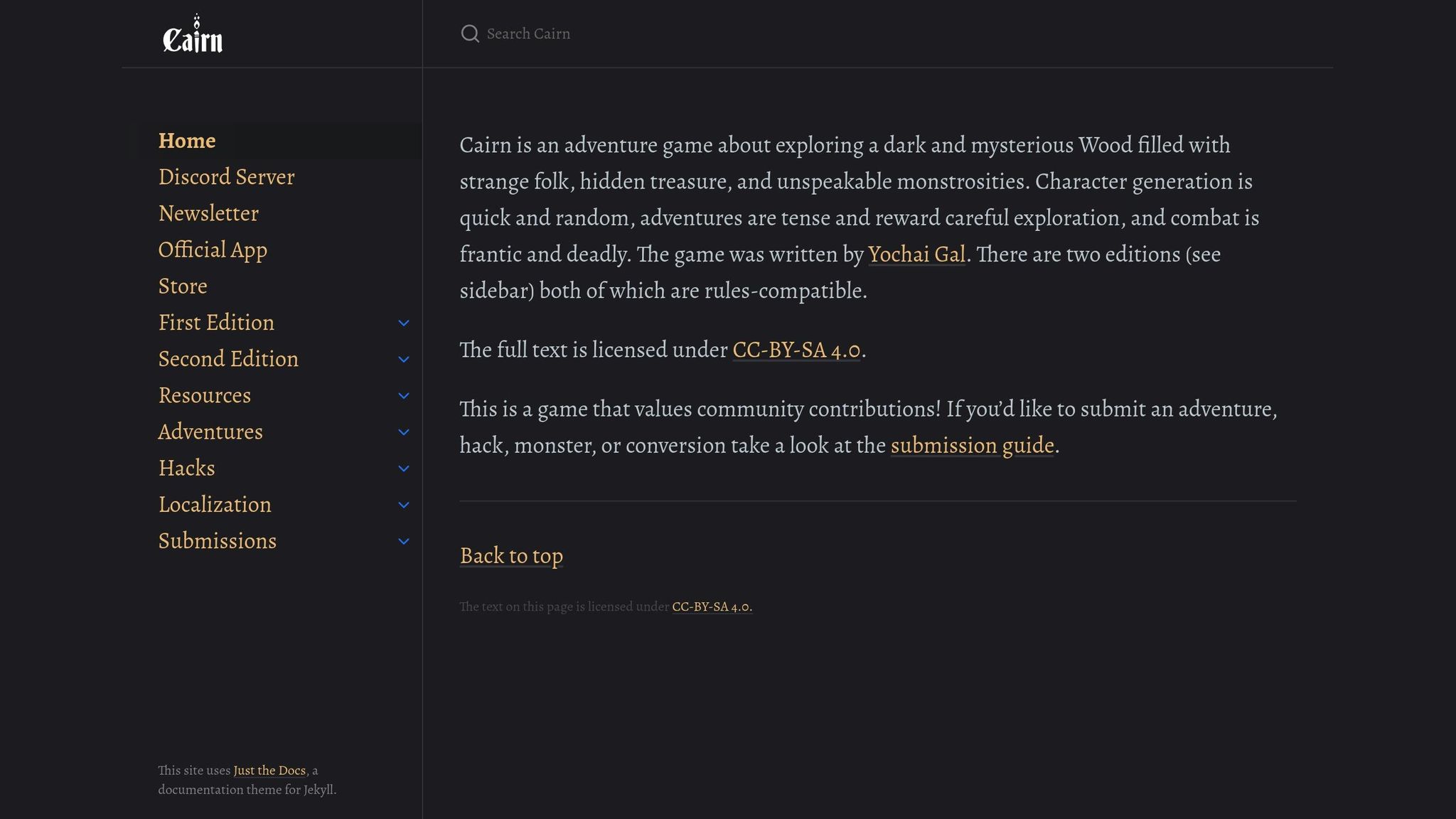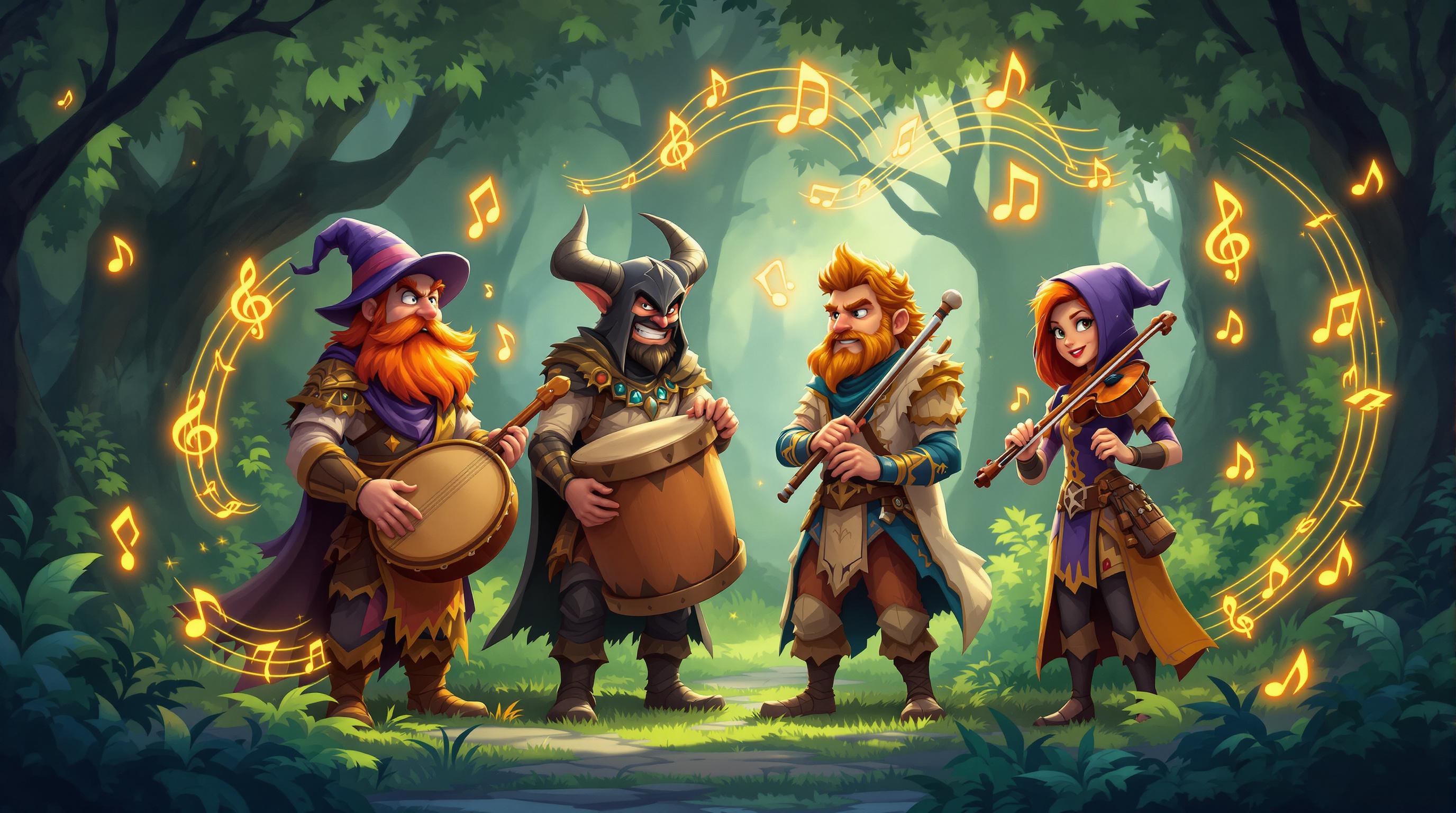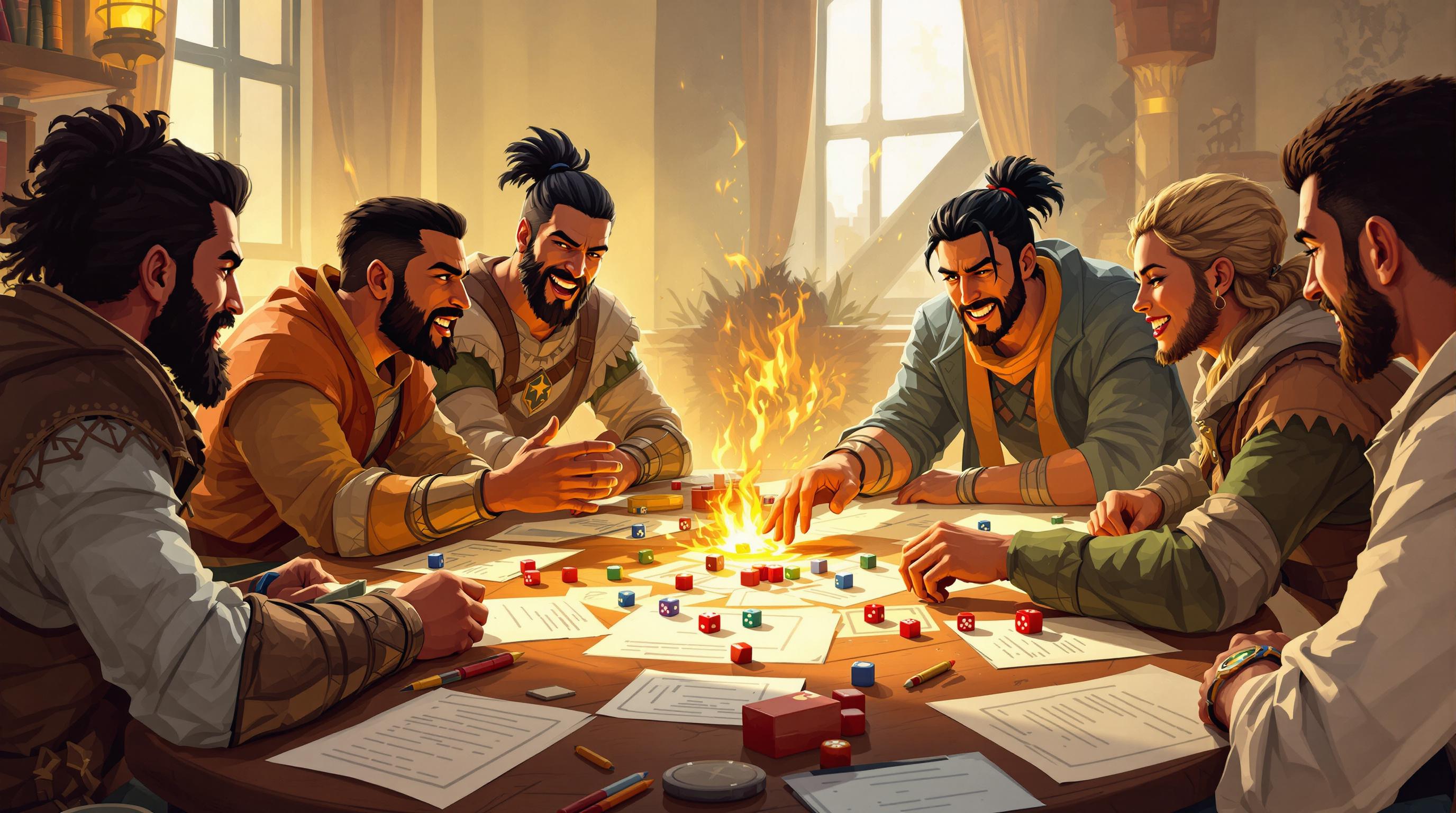Rules-light tabletop RPGs are all about storytelling, creativity, and simplicity. The New School Revolution (NSR) takes this approach further by focusing on minimal rules, player-driven narratives, and flexible gameplay. Here's what you need to know:
- What is NSR? It prioritizes storytelling over complex mechanics, allowing players and Game Masters (GMs) to make quick decisions and focus on the story.
- Core Features:
- Minimalist rules that are easy to learn (often just one page).
- Player creativity and problem-solving over character stats.
- Streamlined systems that keep gameplay fast and engaging.
- Popular Games: Titles like Cairn, Into the Odd, and Troika! showcase NSR principles with unique worlds and simple mechanics.
Why it matters: NSR is reshaping tabletop gaming by making it more accessible and focused on collaborative storytelling. If you want a game where the story takes center stage and rules don’t slow you down, NSR is worth exploring.
Main Elements of NSR Design
Story-First Approach
NSR games prioritize storytelling over intricate rule sets. Both players and Game Masters (GMs) collaborate to craft engaging narratives through dialogue and inventive problem-solving. GMs rely on quick, context-driven decisions, adhering to the philosophy of "rulings, not rules".
This approach encourages players to move beyond relying solely on character stats. As one seasoned GM explained:
"The point is that what is being tested in a 0e game is not character optimization, rote memorization of abilities or base probability estimation but instead a player's ability to think quick on his feet, interpret descriptions and parse them for relevant information, talk convincingly, and give the right prompts to the Dungeon Master." - Age of Dusk
By focusing on narrative, players are given the tools to influence outcomes, as explored further below.
Player Freedom and Choice
NSR design shifts the focus to player ingenuity rather than character abilities. Achieving success relies on creativity and resourcefulness instead of numerical advantages. Players are encouraged to engage in the following ways:
| Player Approach | Impact on Gameplay |
|---|---|
| Environmental Interaction | Taking specific actions instead of relying on skill checks |
| Creative Problem-Solving | Using logic to devise innovative solutions |
| Dynamic Decision-Making | Adapting strategies to tackle unforeseen challenges |
| Narrative Control | Driving the story forward through in-game choices |
This emphasis on player-driven decision-making fosters a more immersive and unpredictable experience.
Simple Rules Systems
To complement player creativity, NSR games employ streamlined rule systems that keep gameplay engaging without unnecessary complexity. This minimalist approach ensures the game remains accessible while still offering depth:
"Minimalism, done properly, is the pursuit of what is minimally necessary to communicate the whole, and as such is an exacting discipline." - noisms
Key features of NSR rules include:
- Focus on essential elements during character creation
- Unified mechanics that apply across various situations
- Progression tied to experience rather than excessive mechanics
- Gameplay centered around items and their use
This simplicity also gives GMs the freedom to design unique creatures and magical items, adding layers of mystery and challenge. Rather than leaning into "superheroic fantasy", this style prioritizes clever thinking and problem-solving over sheer character power.
Creators, explain your tables! #osr #nsr #dnd #ttrpg #zinequest
Popular NSR-Style Games
NSR has sparked the creation of RPGs that focus on simplicity and storytelling, offering a fresh take on narrative-driven gameplay. These games highlight the shift from complex mechanics to streamlined systems that prioritize the story.
Cairn's No-Class System

Cairn is a compact, 20-page RPG that ditches traditional classes, instead shaping characters through their backgrounds and basic traits. Here's how character creation works:
| Character Element | Method |
|---|---|
| Core Stats | Roll 3d6 for STR, DEX, and WIL |
| Starting HP | Roll 1d6 |
| Equipment | 10 slots (6 in the backpack, plus slots for a helmet, body, and 2 hands) |
| Background | Random roll determines the starting profession |
The game is set in a mysterious ancient woodland, emphasizing survival and exploration. Magic isn’t something characters wield innately but rather something they encounter through rare and powerful items. Next, Into the Odd takes a different approach with its rapid and efficient mechanics.
Into the Odd's Quick Resolution

Into the Odd is all about speed and simplicity, offering a system that gets players into the action with minimal fuss. Its 50-page rulebook streamlines gameplay while keeping things engaging. Some standout features include:
- Automatic hits in combat, with damage mitigated by armor
- Saves based on abilities to handle challenges
- Progression tied to exploration and gaining experience
- Unique magical items called Arcana, which add depth and intrigue to the story
This system keeps the focus on the narrative while ensuring that challenges are resolved quickly and intuitively. Meanwhile, Troika! takes a more whimsical approach with its vibrant setting and straightforward mechanics.
Troika!'s 2d6 Framework
Troika! offers a rules-light system that thrives on creativity and player-driven storytelling. Characters are built around three key attributes:
- Skill: 1d3 + 3
- Stamina: 2d6 + 12
- Luck: 1d6 + 6
One of the game's most intriguing aspects is its intentional vagueness, encouraging players to shape the story themselves. As the Troika! Core Rulebook puts it:
"The adventure and wonder are in the gaps; your game is defined by the ways in which you fill them."
The 2d6 resolution mechanic is versatile, handling both contested and static checks with ease. This simplicity makes Troika! perfect for one-shot adventures, where players can dive into one of 36 quirky character options without worrying about long-term character development. Its charm lies in its ability to spark creativity without overwhelming players with rules.
sbb-itb-b8b00a5
Using NSR Methods in Play
NSR methods focus on storytelling, giving players more control, and keeping rules straightforward.
Simplifying Complex Systems
To keep the story moving smoothly, reduce the complexity of mechanics in areas like combat, skill checks, character actions, and magic systems. Here's a quick comparison:
| Aspect | Traditional Approach |
|---|---|
| Combat | Detailed modifiers and conditions |
| Skill Checks | Complex calculations and set difficulty levels |
| Character Actions | Rigid action economy |
| Magic Systems | Strict resource management and fixed rules |
Instead of memorizing every rule, stick to the basics and focus on the essentials.
Running Low-Prep Games
Simplified systems make low-prep games easier to run. Start with these key elements:
- Core Adventure Structure: Map out a simple flowchart with the main story beats and important decision points.
- Character-Driven Elements: Design NPCs with clear motives and resources that can interact meaningfully with the players.
- World-Building Collaboration: Let players contribute to creating the game world, making it more engaging and personal.
"The real key to minimizing your prep is to figure out which prep you actually need, and then only do that."
Common Problems to Avoid
Even with simplified systems, challenges can arise. Here's how to tackle them:
| Challenge | Recommended Approach |
|---|---|
| Over-simplification | Keep enough structure to allow for meaningful decisions. |
| Inconsistent Rulings | Document important decisions to ensure fairness and continuity. |
| Pacing Issues | Use dramatic moments strategically to keep the story engaging. |
| Player Confusion | Offer clear, flexible options and avoid forcing decisions. |
These tweaks help keep the story flowing smoothly while building trust with your players.
Conclusion: Story-Driven Gaming Ahead
NSR Core Concepts Review
The New School Revolution (NSR) is redefining tabletop gaming by placing emphasis on storytelling and streamlined mechanics. At its heart, NSR revolves around three key principles:
| Principle | Effect |
|---|---|
| Rules-Light Design | Simplifies gameplay by focusing on the essentials |
| Player Agency | Encourages creative problem-solving and deeper character engagement |
| Narrative Freedom | Enables dynamic storytelling through flexible rulings |
"What if I cherry pick OSR stuff I like, ditch the rest, & put together a crisp system that does just the things I want?" - hacksnake
This approach prioritizes player creativity and storytelling, while still providing enough structure to support meaningful gameplay decisions. It lays the groundwork for evolving RPG systems that are both accessible and engaging.
Future of Simple RPG Systems
Building on these principles, NSR is leading the charge in transforming game design. Titles like Mörk Borg, Mothership, and Shadowdark show how streamlined mechanics can still deliver deeply engaging experiences without compromising on depth.
Key developments driven by NSR include:
| Trend | Impact |
|---|---|
| System Independence | Moving away from reliance on traditional D&D compatibility |
| Design Innovation | Encouraging fresh mechanics and imaginative settings |
| Collaborative Storytelling | Increasing player involvement in shaping the game world |
"The goal seems to be to improve the functionality and ease of use of as much as possible. To me, both New School and OSR are attempting to improve upon what's come before, but each focuses on a different aspect; New School on the play experience, and OSR on the functionality." - hawkeyefan
The future of tabletop gaming seems to align closely with NSR principles. Designers are finding ways to balance simplicity with narrative richness, paving the way for systems that empower both players and GMs to craft unforgettable stories with minimal complexity.
FAQs
What sets the NSR philosophy apart from traditional tabletop RPG systems in terms of gameplay and player experience?
The New School Revolution (NSR) Philosophy
The New School Revolution (NSR) philosophy shifts the focus of role-playing games to narrative-driven gameplay and player creativity, stepping away from intricate mechanics. NSR games typically feature streamlined rules - often fitting on just a page or two. This simplicity allows both players and Game Masters to craft stories naturally, free from the constraints of bulky rulebooks or overly rigid systems.
What sets NSR apart from traditional RPGs is its emphasis on collaborative storytelling. Instead of relying on pre-written plots or structured gameplay, NSR encourages players and Game Masters to work together in shaping dynamic, unpredictable narratives. Every session becomes a one-of-a-kind experience, driven by imagination and adaptability, creating a truly engaging atmosphere for everyone involved.
How can Game Masters incorporate NSR principles into their tabletop RPG campaigns?
To incorporate New School Revolution (NSR) principles into your campaigns, aim for simplicity and a strong focus on storytelling. Keep the game mechanics straightforward and lightweight, allowing players to channel their energy into creativity and narrative-building. A great way to achieve this is by condensing core mechanics onto a single page, making them easy to reference and ensuring smoother gameplay.
Foster collaborative storytelling by giving players the freedom to shape the game world with their decisions and ideas. Use open-ended prompts to spark their imagination and let the story unfold naturally based on their actions. By emphasizing player-driven narratives and keeping mechanics minimal, you’ll craft an experience that truly embodies the spirit of NSR.
Are NSR games beginner-friendly, and what should new players expect in terms of learning and engagement?
Yes, NSR (New School Revolution) games are incredibly approachable for beginners. These systems are built to emphasize storytelling and creativity over intricate rule sets, making it easy for newcomers to jump in and start playing. Games like Cairn and Into the Odd keep mechanics simple, allowing players to dive into the narrative and improvise without getting bogged down by complicated rulebooks.
For new players, the learning process is smooth and intuitive. NSR games focus on collaboration and imagination, encouraging everyone at the table to contribute to a shared story. This approach creates an engaging, immersive experience that’s ideal for those exploring tabletop RPGs for the first time. These games truly provide a welcoming space where creativity can thrive, making them perfect for players of all experience levels.


